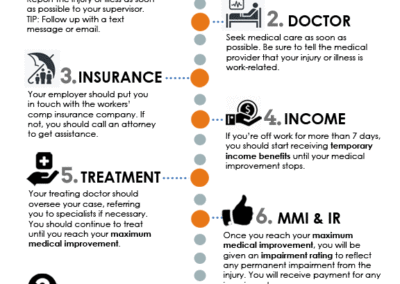
Texas Workers Compensation Overview
The Texas Workers’ Compensation program is regulated by the state in order to provide a medical and financial safety net in the event an employee is injured at work, or suffers a work-related illness.
If you’ve suffered a Compensable Injury on the job (and if your employer participates in the Texas Workers’ Compensation program) then you can file a claim for benefits in order to receive medical care and income benefits (in the event of lost wages). Not all Texas employers participate in the workers’ compensation program, and there is no requirement for an employer to provide workers’ compensation coverage for their employees.
If your employer does not have workers’ comp coverage and you suffered a work-related injury or illness, then you may have a potential “non-subscriber claim”. See more information about non-subscriber claims here.
How The Program Works
While every workers’ compensation case is different, there are some general principles of the program that are almost universal. Below are brief descriptions of the major parts of a workers’ compensation case.
Reporting – If you’ve been injured or have become sick as a result of your employment, you should report your injury or illness to your employer right away. Your employer should then provide you with workers’ compensation insurance information and should file a report with the Division of Workers’ Compensation. Read more about reporting a Workers’ Compensation injury or illness to your employer here.
Seek medical treatment – If you are seen by a doctor for your injury or illness, be sure to tell them your illness or injury happened on the job. It’s important that the medical records reflect that your condition is a result of your job.
Initiating the workers’ compensation claim – Once notified of the illness or injury, the insurance carrier has a limited amount of time to accept or reject the claim. Read more about filing a workers’ compensation claim here.
Lifetime Medical Benefits – Once the claim is accepted, all reasonable and necessary medical care should be covered by the workers’ compensation insurance company (the carrier). Your insurance adjuster will probably make sure that your treating doctor is part of the healthcare network that the carrier uses. You should continue to be treated for your injury as long as medically necessary.
Workers’ Comp Income Benefits – If you are off work for more than 7 days, you become eligible to receive income benefits to replace a portion of your lost wages. If you are eligible to receive income benefits, you should receive weekly checks from the carrier until you reach your “maximum medical improvement” (in other words, until you reach a point where “you’re as good as you’re going to get”). Read more about income benefits here.
Reaching Maximum Medical Improvement – After you reach your maximum medical improvement, your Temporary Income Benefits (TIBS) will stop, and your permanent impairment (if any) will be assessed. If you are found to have permanent impairment because of your work injury, you will be paid for your impairment. If your impairment rating is 15% or higher, and if you earn less than your pre-injury wages (because of your illness or injury) then you may be eligible to receive Supplemental Income Benefits (SIBS) as long as you remain employed or make a good faith effort to find a job that fits within your physical limitations. Read more about reaching maximum medical improvement here.
Continuing Medical Care – Your entitlement to lifetime medical care for your injury will not end. There are no “settlements” in a Texas Workers’ Compensation case, and you can never “sell” your lifetime medical benefit for any kind of “settlement” or “payment”.
Disputes in Workers’ Compensation Cases – From time to time, disputes will arise during the life of a workers’ compensation claim. Many aspects of the claim can be disputed from either party (you or the insurance company). Often, disputes are resolved by simply communicating with the insurance company and working it out. Other times, mediation (Benefit Review Conferences) may be necessary. If mediation fails, then a Contested Case Hearing (a bench trial before an administrative judge) is usually set to resolve the matter. Read more about Workers’ Compensation Disputes here.
Contact Us
Personal Injury Lawsuits Against Your Employer
If you choose to work for an employer that participates in the Texas Workers’ Compensation program, then you enter into a legally binding understanding that 1) your employer’s insurance company will pay for all necessary medical care and a portion of your lost wages (even if the injury or illness was your fault) in exchange for 2) the employer being protected from the threat of lawsuit (if the injury or illness was caused by negligence of the employer or co-worker).
In such a case, your only legal remedy is to file a workers’ compensation claim for medical care and income benefits. So it’s important to understand that regardless of who is at fault for your work-related injury or illness, the employer is protected from civil lawsuits from the injured employee.

Abbott, Clay & Bedoy, L.L.C.
Copyright © 2020 • All rights reserved.
Disclaimer • Privacy Policy
Toll Free 888-434-COMP
Abbott, Clay & Bedoy attorneys are licensed only in the state of Texas unless otherwise indicated in the biographical section. Past performance is no guarantee of future results. We consider employment in another State only in association with co-counsel licensed in that State. References to laws are limited to federal and State of Texas law.


